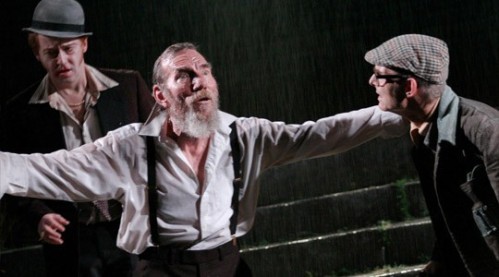
Such sad news at the start of a new year about the death of Pete Postlethwaite. I was lucky enough to spend some time with him in 2008 before the start of his run as King Lear in the Everyman and he really stood out as an extraordinary man. It was a day of Press for him, doubtless being asked the same things over and over again for hours on end, but from the answers he gave and the genuine interest he took in people’s company, you’d never tell. He was a rare interviewee, especially for one so well-known, grounded and lovely, and dedicated to his art. There was something in the air that year, particularly at the Everyman, that still gives me butterflies to think about. Our chat in the foyer of the theatre – tea poured by the man himself (“shall I be mother?” he asked when the pot had been sat there too long for his liking) resulted in one of my personal favourite pieces of work. Quite oddly, I was just looking it up today for another reason entirely. Here it is.
“PETE POSTLETHWAITE is King Lear.” It’s the sort of theatrical event that gets people talking all over the country or even the world, like David Tennant and Patrick Stewart in Hamlet or Kevin Spacey taking over the Old Vic; the sort of theatrical event that people take mini-breaks down to London to see. Not this time. Those lucky enough to have snapped up the advance tickets of this sold-out production will see Postlethwaite, regarded as one of the world’s finest actors, treading the boards where his career began – the Everyman.
He arrived back in Liverpool last week for a day of interviews, not sat stage side like a luvvie or in a fancy hotel like a Hollywood star, but camped out in the middle of the Everyman foyer as if it were the most ordinary thing in the world. A new, huge Lear-esque beard detracted from his ever- distinctive features, and a thick cream cable- knit jumper made him look as potentially regal as if he might fancy a spot of deep-sea fishing. He proved to be, as ever, as normal as he is extraordinary.
“I don’t know why, as a person, I wanted to do this,” he begins. “But when the opportunity came up and the stars aligned themselves – the Everyman, Capital of Culture, [director] Rupert Goold, myself, I couldn’t walk away if I wanted to.”
Postlethwaite admits to being “really gobsmacked” as to all the attention. “When your local postman comes down the lane in Shropshire and says ‘it’s a load of rubbish Pete, I can’t get tickets to your show’ – when someone tells you it’s sold out, there’s a lot at stake in that respect.”
Such as?
“Failing,” he says earnestly, before starting to laugh. But if we do fail, you can bet your bottom dollar we’ll fail spectacularly.”
Which begs the question as to how the 62-year-old actor came to the point where he was ready to take on one of theatre’s most illustrious roles. “You don’t choose to play Lear – you find you have to. You’re up against a rock and a hard place,” he says. There’s something grandiose about his way with words, but he speaks with humanity, rather than theatricality. Like a true Northerner, he fusses over the tea on the table, making sure it is poured and fretting about it going cold.
He has been learning his lines for a year, he says, and endlessly ponders whether he is preparing for the role enough. He has performed in Lear twice before – once at college, and again in the 1980s in Stratford-upon-Avon, with a cast including Michael Gambon and Jenny Agutter. He played the Duke of Cornwall and understudied Lear. He returned to the stage – and the Bard – for the first time in years in 2007, as Prospero in the Tempest at the Manchester Royal Exchange. His re-emergence in the North West was feted as a homecoming for the Warrington-born actor, but, for Postlethwaite, Liverpool, and the Everyman, is something else entirely.
“Just coming into the place, walking onto Hope Street, was extraordinary. This is more like coming back to the womb than a homecoming. It is more like embryonic.”
The Everyman’s 1970s golden age is the stuff of theatre legend, the place where he and cohorts including Bill Nighy, Matthew Kelly, Julie Walters, and Willy Russell honed their craft. It was, he says, “the most extraordinary, fascinating, dangerous time”.
“It was then I realised this was what I was born to do, even if I never made any money. There were times when, after a show, we would all pile into a van and do a show in a pub. If you were on bar duty, you’d have to clean the bar as well. We had to run the theatre because they couldn’t afford staff. But it was a very exciting time. I felt absolutely part of a group that needed to be together, that needed each other, doing it because we wanted to do it. It was very inspiring and rewarding, although it might not have felt like I thought it at the time, for £22 a week, or however little it was.”
It was a love affair that began the moment Postlethwaite stepped through the doors of the humble Hope Street theatre to see his first ever plays, a triple whammy of Waiting for Godot, Look Back in Anger and Murder in the Cathedral. “It was absolutely stunning,” he recalls. “I thought ‘I don’t know what they’re doing, but I’d like some of that!’”
And it’s something that is reciprocated to this day. “I’ve always been incredibly welcomed back to Liverpool. Maybe it’s because I’m from Warrington, but I’ve always felt that incredible warmth and that glad-to-see-you kind of feeling. I get accosted by 16-year-olds and 70-year-olds, it’s across the board. People want to ask about Leonardo di Caprio or the Usual Suspects, or children want to know about James and the Giant Peach.
“I suppose it’s because I do Liquorice Allsorts stuff – good quality television drama, or a film that’s touched people like Brassed Off or Romeo and Juliet. But that doesn’t prepare you for everyone going ballistic for King Lear. That’s a bit worrying.”
Rehearsals for the play begin in London today, before the opening night on October 30. Advance tickets are sold out, but a small number of tickets will be released each day for that night’s performance. As for how it will all turn out, nobody knows, least of all the star.
“There’s only so much you can do to prepare for the unknown,” Postlethwaite says. “This is a learning process. A lot is in the lap of the gods. There’s no reason why this bunch of people can’t make a good production of King Lear with what we’ve got. There’s always fear of failure, of your inability, physically and emotionally, to fulfil what Lear demands of you. I’ve never felt that before in a production. But to simply stand up and tell the story is exciting. We’re dealing with one of the greatest pieces in the history of man – and woman – and to be given the privilege of dealing with this stuff is an honour and a challenge well worth taking up.
“The stars have aligned,” he says again. “I had no option.”
This interview first appeared in the Liverpool Daily Post on September 22, 2008.

